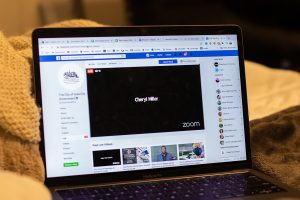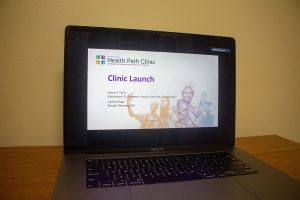ICCSD develops toolkit for teaching sensitive topics in a politically charged time
Laura Gray, the director of diversity and inclusion in the Iowa City Community School District, developed a resource for teachers to refer to when covering slavery or race relations in the classroom.
Iowa City Community School District sign 1725 North Dodge St. as seen on Thursday, Oct. 15, 2020.
October 21, 2020
What is appropriate classroom conduct when teaching slavery? Under what circumstance is it appropriate to show content that uses the racial slurs? What if a lesson causes harm?
Laura Gray, the director of diversity and inclusion, has provided a resource for educators in the Iowa City Community School District with questions on teaching sensitive topics. On the padlet titled “Cultural Proficiency Check: Teaching on Slavery and Racially Charged Themes Toolkit,” Gray organized articles from outside resources and documents she made based on her own life experience and through a restorative justice lens.
Early this school year, a teacher in the districts’ online learning program gave students a writing assignment where they were asked to pretend they were a slave. According to reporting from the Iowa City Press-Citizen, the teacher was placed on administrative leave.
After this incident, Gray wanted to provide resources to the staff.
“I felt like it was in my area to put some tools in place for our staff. When they’re specifically teaching about slavery, or teaching slavery units, and/or teaching things that are about race or other sensitive topics,” she said. “They can use some of the suggestions not just for race, or for LGBTQ, for religion, and other areas that they think might come up that might potentially be triggering to our diverse population of students.”
The toolkit is not mandatory for educators to use and Gray said the goal is not to take away teacher’s autonomy in choosing classroom resources. The toolkit instead gives teachers another way to be proactive and precautious when taking on racially sensitive topics.
“As educators, it’s our job to be flexible and responsive and ultimately try to do no harm in our work,” she said. “And I know that our teachers care about all of our students and really do not intend to do harm … I want to wrap around the teachers with some extra tools to utilize to stay out of the weeds.”
The first item in the toolkit is an audio file from Gray, welcoming users to the toolkit, explaining the intent of the resource and how it can be applied to units on race and other sensitive topics. Other documents in the padlet include “Do’s and Don’ts of Teaching Slavery,” which Gray adapted from the Oklahoma Racial Justice Site. Gray also included information for teachers that want to submit their lesson for a voluntary and confidential critique.
Gray shared the padlet with the school board on Oct. 13. School board president Shawn Eyestone said he was excited to see the toolkit, and that in his personal and professional life he has struggled with how to talk appropriately talk about race and slavery.
“I think people are all at different places in that continuum on being able to talk about it. Much like any other topic that our educators are tasked with doing, it takes practice, it takes professional development, and it takes help. I think this is a great tool to help folks feel more comfortable,” he said.
On Oct. 16, Gray sent the padlet out to educators at all levels. Although it’s most relevant to those teaching social studies or literature that covers racial issues, she hopes everyone can translate the intention of the toolkit to other areas of diversity, equity, and inclusion.
“I think it’s a great tool to have in a teacher’s repertoire in order to better understand a way to reach their students,” said Ruthina Malone, vice president of the school board. “And it’s not just for our teachers, as Laura Gray mentioned during the meeting, any staff person within our district can hop in there and look up resources and get a better understanding of how to connect with all of our students. So, I just see it as an extension of being great educators and staff members in using this as a tool.”






